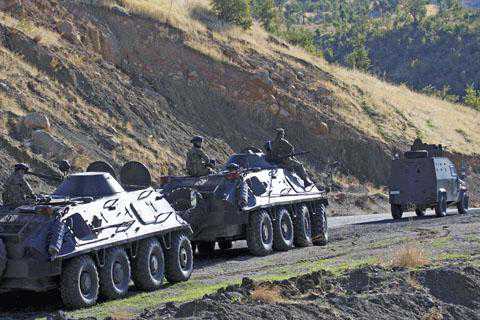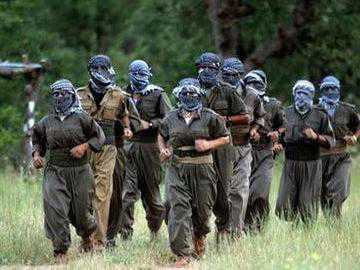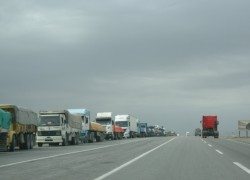Dorian Jones | Istanbul
December 16, 2011
The U.S. secretary of defense is visiting NATO ally Turkey. He arrived in the Turkish capital, Ankara, after attending a withdrawal ceremony Thursday in Bagdad of American troops all of whom are due to leave by the end of the month. With the U.S. withdrawal, Turkey is now being seen by Washington as playing a potential key role in Iraq.
U.S. Defense Secretary Leon Panetta is spending two days in Turkey meeting the country’s political leadership, with Iraq expected to be a key topic on the agenda.
The NATO allies are already increasingly cooperating in the region.
Last month, the U.S. transferred drones from Iraq to the Turkish airbase of Incirlik close to the Iraqi border.
International relations expert Soli Ozel of Kadir Has University says with U.S. forces pulling out of Iraq at the end of the month, that cooperation will only deepen.
“I suppose many more drones, flying over Iraq in order to continue to monitoring things,” said Ozel. “And I guess they want Incirlik to be open, more open, to American use as well. Politically, they would want Turkey to make sure that things never get of hand between Kurds and Arabs. And in [a] way maintaining the autonomy or viability of the Kurdistan regional government territory.”
The semi-autonomous Iraqi Kurdish region, which borders Turkey, is, according to observers, strategically important to Washington.
Last month, Turkish Foreign Ministry spokesman Selcuk Unal said Washington has proposed to take over the influential role of training Iraqi military personal, now that U.S. troops are pulling out.
“We have been contributing in training military elements in Iraq within the framework of NATO,” said Unal. “This issue has come up to the agenda, and of course, we will be considering it.
Such a move is seen as strengthening Turkey’s influence in greater Iraq and countering what observers say is expected growing Iranian influence with the withdrawal of U.S. forces.
Diplomatic columnist Semih Idiz for the Turkish daily Milliyet says Ankara shares Washington’s concerns about growing Iranian influence in Iraq.
“The increase of the Iranian through Shia elements in Iraq, that is what Turkey will be worried about,” added Idiz. “And with Turkey there is a political competition going on for influence between Iran and Turkey.”
Ankara has in the past few years been seeking to extend its political influence in Iraq. It reportedly backed a coalition of Sunni and secular groups led by Ayad Allawi in Iraq’s general election last year, against the incumbent Prime Minister Nouri al-Maliki, who is seen as being close to Tehran.
But international relations expert Soli Ozel says while Ankara may be willing to challenge Iranian influence, there is already growing irritation in Baghdad towards Ankara.
“It will want to play a role, but just last week, Maliki was rather curt about Turkey and what Turkey was trying to do,” noted Ozel. “So relations may not be that great. And that is not a surprise since Turkey did not want Maliki to be prime minister.”
Any attempt by Ankara to challenge Iranian influence in Iraq will likely strain relations with Tehran. Those relations are already under pressure over Ankara’s support for the opposition against Tehran’s key ally, Syrian President Bashar al-Assad.
Murat Bilhan, former senior Turkish diplomat and professor of international relations at Kultur University, says Iraq is part of a wider trend driving apart the once close allies.
“They have diverged, that is a fact,” said Bilhan. “It’s a rival anyway – rival in central Asia, the Persian Gulf, Syria and the whole region.”
That prospect, observers say, will be undoubtedly welcomed by Washington. The expected growing cooperation between Ankara and Washington on Iraq, they say, will only strengthen bilateral relations, which will only add to Tehran’s angst.
via VOA Standard English – Turkey Playing Increasing Role in Iraq.





